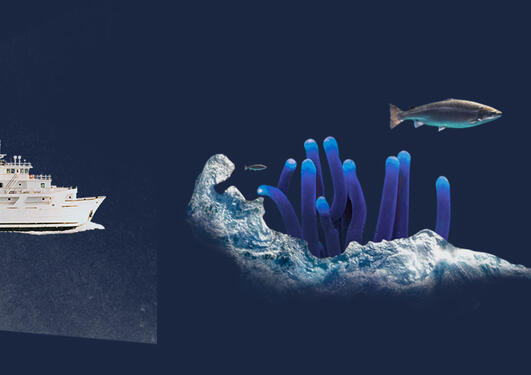Research possibilities for the SEAS postdoctoral research fellow in marine biogeochemical hazards
The information on this page is a supplement to the complete advertisement of the position in the recruitment-portal Jobbnorge. The full advertisement of this position in Jobbnorge will be available after august 1, and linked from this webpage. Call deadline is October 31, 2021.
Hovedinnhold
Position | SEAS postdoctoral research fellow at the Bjerknes Center for Climate research |
Research area | Marine biogeochemical hazards |
Supervisor | Professor Christoph Heinze |
Mobility | For an incoming candidate |
Unit of employment | Geophysical institute at University of Bergen |
Group affiliation(s) | Research group on biogeochemistry/Research theme ‘Carbon System’ at the Bjerknes Center for Climate research |
Thematic area and supervisor
This position is connected to the thematic area of marine biogeochemical hazards under warming, ocean acidification, and deoxygenation. The position is open to an incoming candidate, see mobility rules. The successful candidate will be employed at the Geophysical Institute and included in the research group on biogeochemistry as well as the Research theme ‘Carbon System’ at the Bjerknes Center for Climate research. Information about the supervisor and research possibilities for the fellow is available below. For further details about the research possibilities please contact Professor Christoph Heinze.
Research possibilities and resources
The supervisor: Heinze is a global biogeochemical ocean modeller with 30 years’ experience in the field. His specific research interests are devoted to feedback processes between climate and biogeochemical cycles, the interpretation of the marine sedimentary paleo-climate archive, and the quantification of the global carbon and silicon cycles. Heinze has experience in coordinating large international EU projects (such as the ongoing EU H2020 project COMFORT, https://comfort.w.uib.no/). Heinze has initiated and is leading course GEOF347 at UiB: Seminar on "Earth system science for sustainability studies".
The research group: The modelling group includes expertise on Earth system modelling, relevant biogeochemical processes and how to implement them in ocean models, numerical computing, mass data analysis, and model experiments with stand-alone ocean models as well as coupled Earth system models. The position is embedded in both the biogeochemistry group at the Geophysical Institute (sub-group on modelling) (https://www.uib.no/en/rg/chemoc) and the Research Theme “Carbon System” at the Bjerknes Centre for Climate Research (https://www.bjerknes.uib.no/en/carbon-system-0).
Available infrastructure: Access to national high-performance computing and mass data storage facilities (Sigma2) is available. The group cooperates with the Bergen and Oslo communities on further developing the Norwegian Earth System Model NorESM. The group currently participates in several other projects involving Earth system modelling funded by the RCN and the EU. A data management group helps concerning archiving/disseminating results.
Research possibilities for the fellow - topical frame: The postdoctoral fellow position is connected to the thematic area of marine biogeochemical hazards. The position is in the field of biogeochemical ocean modelling and model data analysis. The oceans are undergoing fast – in part abrupt – changes in physics, biogeochemistry, and ecosystems under human-induced climate forcing. Warming, ocean acidification, and de-oxygenation provide substantial marine environmental hazards. We employ global coupled Earth system models and global ocean models their results for identifying specific dangerous change, its time of emergence, its temporal behaviour (including persistency and irreversibility), respective early warning indicators, and feasible mitigation options to limit the damage.
International linkages and collaborators: Nicolas Gruber (ETH Zürich, Switzerland), Fortunat Joos and Thomas Frölicher (University of Bern, Switzerland), Marion Gehlen (IPSL/CEA, Saclay/Gif-sur-Yvette, France), Roland Séférian (MF-CNRM, Toulouse, France), Andreas Oschlies (GEOMAR, Kiel, Germany), Thorsten Blenckner (Stockholm University, Sweden).
Possibilities for collaboration with other sectors: Candidates are here the relation to fisheries and management of marine living resources, marine protected areas, ecosystem management, ecosystem restoration, ocean health aspects, protection of the Earth system through arts and philosophy, ocean governance, and legal frameworks.
Potential for policy impact: Here exist options to provide science-based guard rails for policy makers and decision makers concerning risks and impacts associated with greenhouse gas emissions and other human drivers of Earth system change, individual vs. international mitigation measures, legal aspects of ecosystem damage, and the conservation of natural heritage, and food production for a growing world population.
Potential UiB groups at other that may offer a co-supervisor (for cross-disciplinary work):
- Centre for climate and energy transformation, https://www.uib.no/en/cet
- Group LINGCLIM: Language, climate, and lifestyle, https://www.uib.no/en/rg/lingclim
See the full advertisement in Jobbnorge
The full advertisement in Jobbnorge will be available after august 1, 2021. Call deadline is October 31, 2021.
